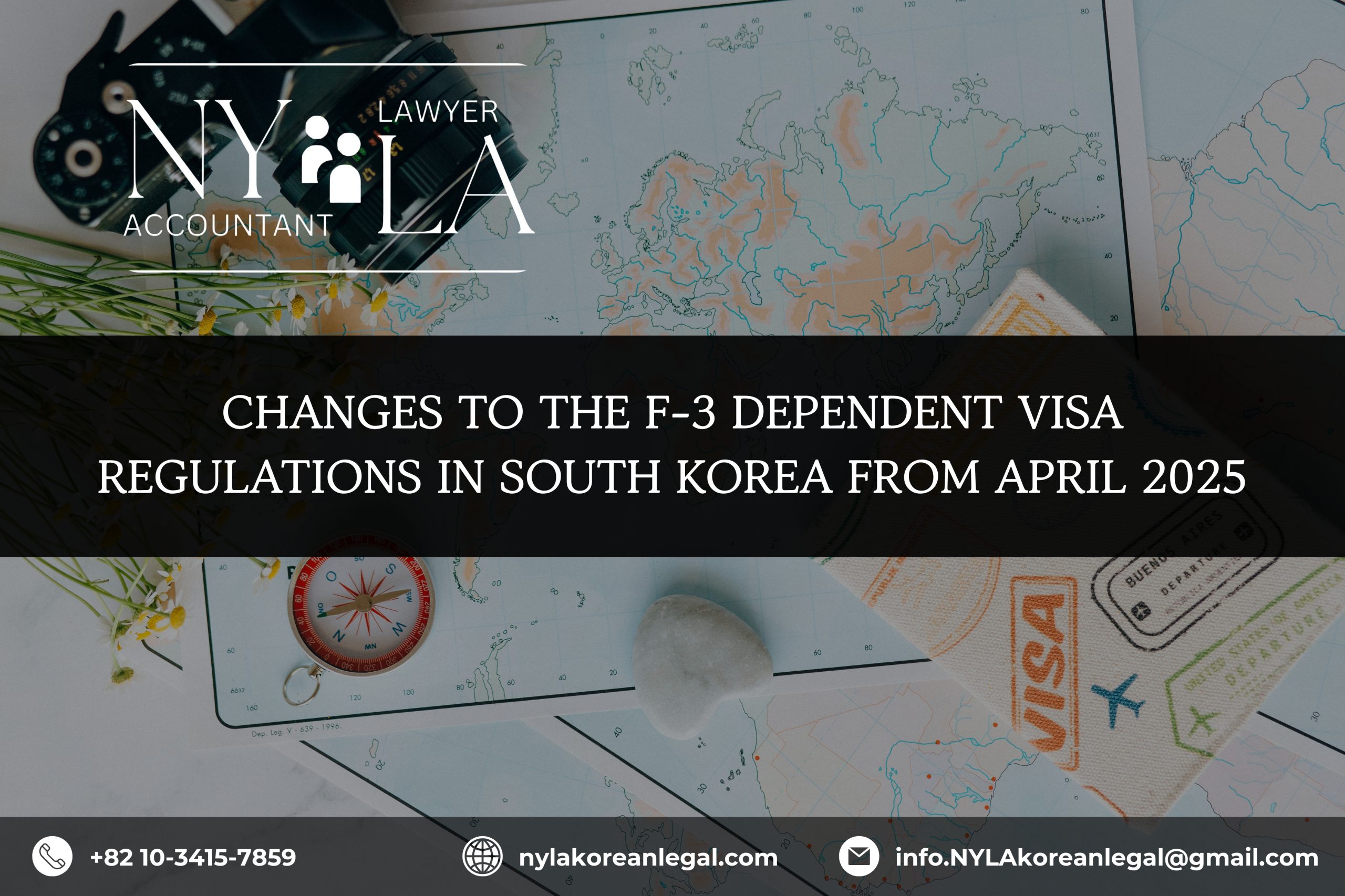Summary
I. Legal Basis
- Immigration Control Act of South Korea: Provides the legal foundation for the issuance, extension, and change of visa status.
- Enforcement Decree and Rules: Detailed guidelines on how the law is implemented.
- Administrative Notices and Implementation Guidelines from the Ministry of Justice (MOJ): Specific regulations on the F-3 visa, including procedures, implementation timelines, financial requirements, and documentation.
- Immigration Offices / HiKorea Portal: Official agencies responsible for receiving applications, publishing forms, and announcing updates.
- Hague Apostille Convention (1961): International basis for the legalization of family relationship documents.
II. Previous F-3 Visa System (Before April 2025)
- Prior to the 2025 changes, the F-3 dependent visa process included the following characteristics:
- Dependents (spouse and minor children) of individuals holding valid work, residence, or long-term stay visas could apply for the F-3 visa to accompany or join the primary visa holder in Korea.
- It was possible for dependents to enter Korea first (on a visa-exempt basis or with a short-term visa) and change their status to F-3 within Korea.
- Family relationship documents (e.g., marriage certificate, birth certificate) did not necessarily require international legalization or apostille — certified copies were often sufficient depending on internal policies.
- Financial proof from the primary visa holder was required but not overly strict — usually proof of income or savings.
- Application procedures were relatively flexible and could be processed domestically in Korea.
This system allowed for more flexibility, lower documentation burden, and quicker family reunification within Korea.

III. Key Changes from April 2025
As of April 2025, South Korea has implemented significant changes to tighten control over dependents entering under the F-3 visa category.
1. Suspension of In-Country Change of Status to F-3
- Starting April 2025, the Korean Immigration Office no longer accepts in-country applications for status change to F-3 for dependents who are already in Korea (whether they entered on short-term visas or are switching visa status internally).
- Previously, dependents could enter Korea and apply for a change of status to F-3 domestically if eligible. This is now suspended, except for special humanitarian cases such as pregnancy, recent childbirth, or severe illness, which will be evaluated individually.
- As a result, if the principal applicant is already in Korea, the dependent can no longer “follow” by applying for an F-3 status change from within Korea (except in humanitarian cases).
2. Two New Application Routes
Due to the suspension of in-country status change, dependents (spouse/children) and the principal applicant must now choose one of the following two methods to apply for the F-3 visa:
- Visa Issuance Confirmation Number (VICN) Route: The principal applicant and their dependents jointly apply for a Visa Issuance Confirmation Number (VICN) at a Korean immigration office. Once issued, this VICN is used by both the principal and dependents to apply for the F-3 visa at a Korean embassy/consulate in their home country.
- Apply at Korean Embassy/Consulate Abroad: After the principal applicant has received their visa and Korean residence card, dependents must apply for the F-3 visa at a Korean embassy/consulate in their country of residence.
Therefore, in most cases, dependents can no longer apply in-country and must go through offshore application (either via embassy or VICN).
3. Requirement for Legalized Family Relationship Documents
- Starting April 2025, all documents proving family relationships — such as marriage certificates (for spouses) or birth certificates (for children) — must go through international legalization procedures. Depending on the country of issuance: If your country is a member of the Hague Apostille Convention, you must submit an apostille. If not, the documents must be legally authenticated via the Korean embassy or relevant consular office in the issuing country.
- If the original documents are not in English or Korean, they must be translated into Korean or English and certified by a licensed translator.
- Legalization must comply with the specific procedures required by the country where the certificate was issued.
This new requirement enhances document authenticity but increases the paperwork burden for applicants.
4. Letter of Guarantee and Proof of Residence Required
- All F-3 visa applications from April 2025 onward must include: Letter of Guarantee from the inviting person (i.e., the principal applicant or their employer).
- Proof of residence in Korea, such as: rental contract, company-provided housing confirmation, hotel reservation, if no confirmed accommodation yet, a housing plan, supporting documents showing the housing search, etc.
- If only a “housing plan” is submitted (and not a confirmed rental), approval is at the discretion of the immigration officer, meaning it’s not guaranteed.
5. Stricter Financial Requirements (Effective July 1, 2025)
From July 1, 2025, new financial capacity standards apply to F-3 visa applications. The principal applicant must prove the ability to support their dependents financially.
- Minimum income thresholds will be based on household size (i.e., principal, spouse, children).
- If the income falls below the standard but is within 10%, the shortfall can be covered by showing a bank deposit with at least 5 times the shortfall amount.
- Acceptable Proof of Financial Ability Includes:
- Certificate of Income from the Korean National Tax Service (if applicable).
- If income is low: Combine with domestic bank account balance (maintained for at least 6 months) in the principal applicant’s name.
- For those employed in Korea: Employment contract with clear salary details.
- If income is from overseas: Provide dispatch letter, employment contract, and proof of income transfers.
- If income cannot be clearly verified: Use a bank account balance (domestic or foreign) held for at least 6 months. Joint accounts with spouses are acceptable.
- If income does not meet the standard, but the gap is small, it can be compensated with long-term savings.
IV. Real Impacts and Consequences
These policy changes are not just additional paperwork — they have significant impacts on immigrants, foreign professionals, employers, and visa services:
- Reduced flexibility for dependents: No more entering Korea first and then switching to F-3 status. Dependents must prepare and apply from abroad, increasing costs (flights, temporary housing, consular fees) and requiring more time.
- Longer processing times: Due to legalization, translation, and financial verification, applications may take longer to process. (KPMG noted this could “significantly lengthen processing times”).
- Stronger financial burden: Stricter income thresholds and savings requirements may hinder families if the principal does not have stable or high income.
- Rejection risk: Incomplete legalization or weak financial documents could lead to visa denial, affecting family reunification and job opportunities.
- Impact on decision to work in Korea: Foreign professionals may reconsider offers if family reunification is uncertain. Employers may need to provide more support.
- Opportunity for legal and visa services: Due to complexity, there will be high demand for immigration consultants, lawyers, and document services.
V. Important Tips for Preparing F-3 Visa Applications
To increase the chances of successful F-3 visa approval under the new rules:
- Start early: Begin preparations months in advance, especially for document legalization, translation, and financial paperwork.
- Choose the right submission method: If the principal is in Korea: consider applying for VICN. If the principal already has a visa and residence card: apply via Korean consulate/embassy abroad.
- Check family relationship documents: If your country is a Hague member, use an apostille. If not, go through embassy/legal authentication.
- Translate & certify documents properly: If not in Korean or English, use a certified translator and obtain official certification.
- Prepare a clear Letter of Guarantee: It should explain the relationship, financial responsibility, intended residence, and commitment to support.
- Provide solid proof of residence: Best to submit a rental contract or company housing confirmation. If not, prepare hotel booking + housing search plan.
- Show strong financial capacity: If income is low, build up a long-term savings account. For overseas income, prepare relevant documents.
- Stay updated: As these are new policies, monitor HiKorea or the Ministry of Justice for further updates or clarifications.
VI. Conclusion
The F-3 visa policy changes from April 2025 reflect a stricter, more controlled approach by the Korean government to managing dependent visas. Key changes such as:
- Suspension of in-country status changes,
- Mandatory legalization of relationship documents,
- Stricter financial requirements,
… all signify a higher burden on applicants.
- Don’t wait until the last minute — start preparing now.
- Ensure documents are properly legalized and translated.
- Consider professional immigration support if possible.
- Regularly check updates from HiKorea or the Korean Immigration Service.
VII. About NYLA – Korean Legal Office

■ NYLA – Your Trusted Legal Partner in Korea
At NYLA, we understand that the success of foreign businesses in Korea requires not only a solid business strategy but also reliable legal support. With a team of experienced Korean attorneys and legal professionals, NYLA provides tailored legal services for companies, investors, and individuals operating or planning to establish a presence in Korea.
We support our clients throughout the entire business journey with comprehensive services, including:
- Legal consultation on company establishment, taxation, and immigration;
- Advice on commercial real estate, franchising, and product distribution;
- Support in human resources, marketing, and business strategy.
In addition to legal advisory, NYLA also represents clients in civil litigation cases related to business, labor, marriage, family, and inheritance to ensure their rights and interests are fully protected.
■ Contact NYLA

If you’re a foreign business or individual looking for a reliable legal partner in Korea, NYLA is here to help. We are committed to delivering effective, practical, and personalized legal solutions for every client.
With a proven track record of assisting hundreds of international clients, our team is equipped to help you navigate complex legal challenges—whether it’s commercial disputes, contract issues, or foreign investment guidance.
Don’t let legal matters hold you back. Let NYLA be your trusted guide in the Korean market.
■ Get in touch with NYLA for expert legal support
| Website: https://nylakoreanlegal.com/
FB: https://www.facebook.com/nyla.koreanlegal Tiktok: https://www.tiktok.com/@nylakoreanlegal Youtube: https://www.youtube.com/@NYLA-xd8qx Email: info.NYLAkoreanlegal@gmail.com SĐT: +82 10-3415-7859 |
 |






















































